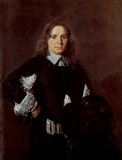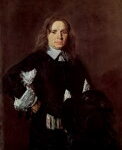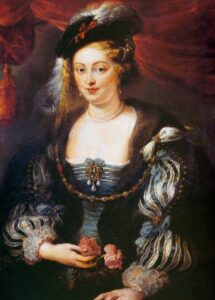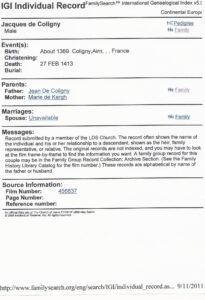
Date of Birth
1369
Place of Birth
Rhone Alpes, France
Towns / Cities Moved Into
Rhone Alpes, France |
Champagne-Ardenne, France
Known Occupation
Seigneur de Coligny
Religion
-
Spouse
Death Information
Year of death
February 27, 1413
Place of death
Bresse, Italy
Cause of death
-
Obituary

Parents

Jean Coligny

Marie Coligny (born Kerge)
Marital Status


Married Huguette DeLaBaume
1405
La Bresse, Vosges, Grand
Est, France
Children

Narrative / Story
In the lush valleys of Rhone Alpes, France, Jacques Coligny was born in 1369, into a world brimming with medieval intrigue and burgeoning national identities. His childhood, nestled in the heart of France’s scenic beauty, was shaped under the watchful eyes of his parents, Jean and Marie Coligny. From a young age, Jacques was immersed in the responsibilities and privileges of nobility, destined to uphold the legacy of the Coligny lineage.
As Jacques grew, so did his awareness of the turbulent times he lived in. The late 14th century was a period marked by the relentless drumbeat of the Hundred Years’ War, a conflict that not only ravaged lands but also forged a sense of national consciousness. Amidst this backdrop of conflict and change, Jacques, known affectionately as “Jacquemard” or “Jacquemart,” stepped into his role as Seigneur de Coligny, a title that demanded both leadership and stewardship.
Jacques’ personal life was as intricate and nuanced as the era he lived in. His first marriage to Huguette de la Baume, a union that intertwined love with familial duty, brought forth three children: Guillaume, Étienne, and Antoinette. This marriage, rooted in the customs of the time, was a blend of personal affection and strategic alliance. Later, his relationship with an unnamed partner, though not sanctified by marriage, bore him another child, Jean, adding a layer of personal complexity to his noble life.
In his role as a noble, Jacques was insulated from the daily struggles of the peasantry, yet he was deeply entwined with the socio-economic fabric of his time. His life was a delicate balance of managing his estates, ensuring the welfare of those under his charge, and navigating the intricate web of feudal allegiances. This era, fraught with the constant specter of war and shifting political landscapes, demanded from Jacques a blend of strategic acumen and compassionate governance.
The Battle of Nicopolis in 1396 was a defining moment in Jacques’ life. This crusade, a collision of East and West, saw Jacques and his fellow European knights pitted against the formidable forces of the Ottoman Empire. The battle, which culminated in a crushing defeat for the Crusaders, was not just a military engagement but a symbol of the era’s broader religious and cultural conflicts. For Jacques, participating in this historic battle would have been both an honor and a testament to the harsh realities of medieval warfare.
The aftermath of the Battle of Nicopolis reverberated through Europe, signaling the waning influence of the Crusader states and the rising tide of the Ottoman Empire. This period was characterized by a palpable tension between the Christian kingdoms of Europe and the Muslim powers of the East, a struggle that defined much of the era’s geopolitical landscape. For Jacques, this battle was a stark reminder of the shifting power dynamics of his time.
Jacques’ life, however, was not solely defined by warfare and noble duties. It was also a tapestry of personal moments – of love, fatherhood, and the everyday joys and sorrows that accompany a life lived fully. These personal experiences, set against the backdrop of a tumultuous era, added depth and color to his character, making him a man of his time, yet timeless in his humanity.
In 1397, Jacques’ journey came to an end in Champagne-Ardenne, France. The details of his passing remain shrouded in the mists of history, leaving a sense of mystery around his final days. His death marked the close of a chapter not only in the Coligny family’s history but also in the tapestry of medieval French nobility.
Reflecting on Jacques Coligny’s life offers a glimpse into a pivotal era in European history. His story, woven into the larger narrative of 14th-century Europe, encapsulates the complexities of nobility, the burdens of leadership, and the personal trials and triumphs of a man navigating a world in flux. His legacy, like that of many in his time, serves as a reminder of the intricate dance of power, duty, and personal destiny that shapes the course of history.
In the end, Jacques Coligny’s life stands as a testament to the enduring human spirit, a narrative that resonates across the centuries. His story, set against the grand canvas of medieval Europe, is a poignant reminder of our shared past, a past filled with battles and love, duty and desire, and the unending quest for meaning and purpose in the ever-unfolding saga of human existence.
